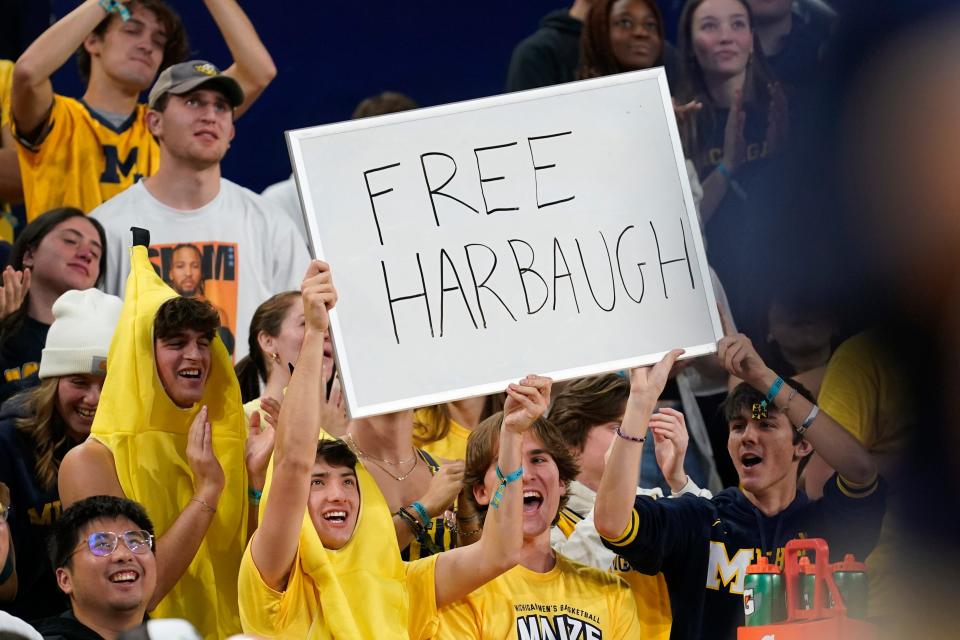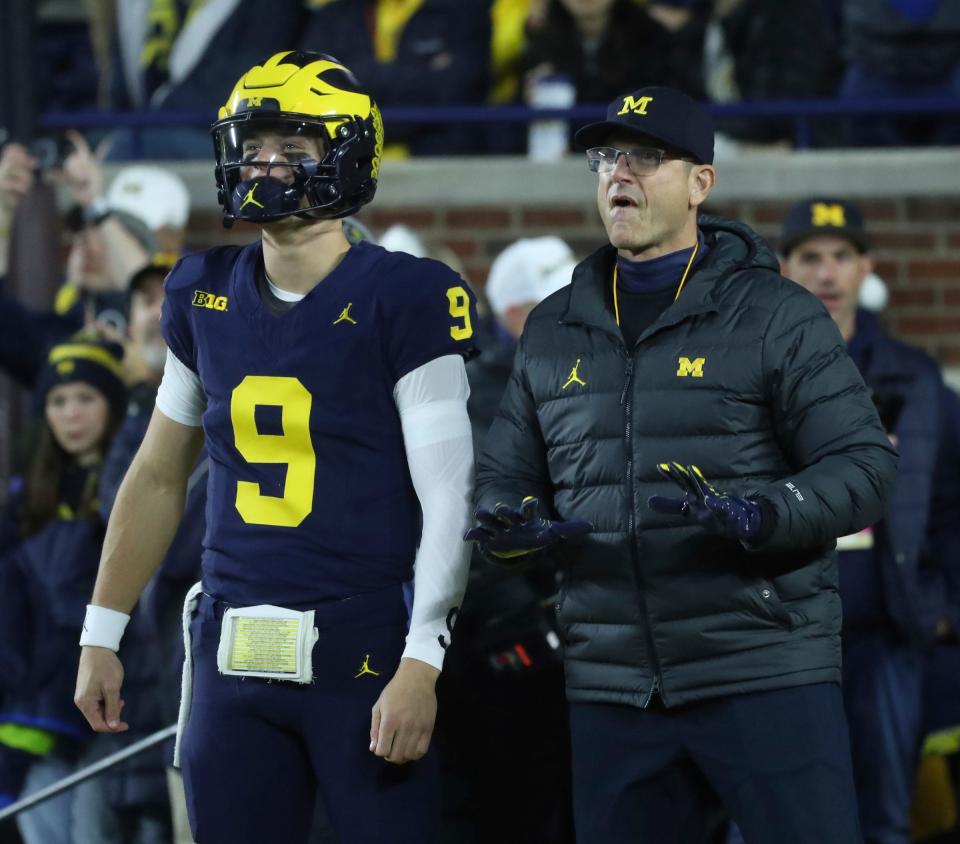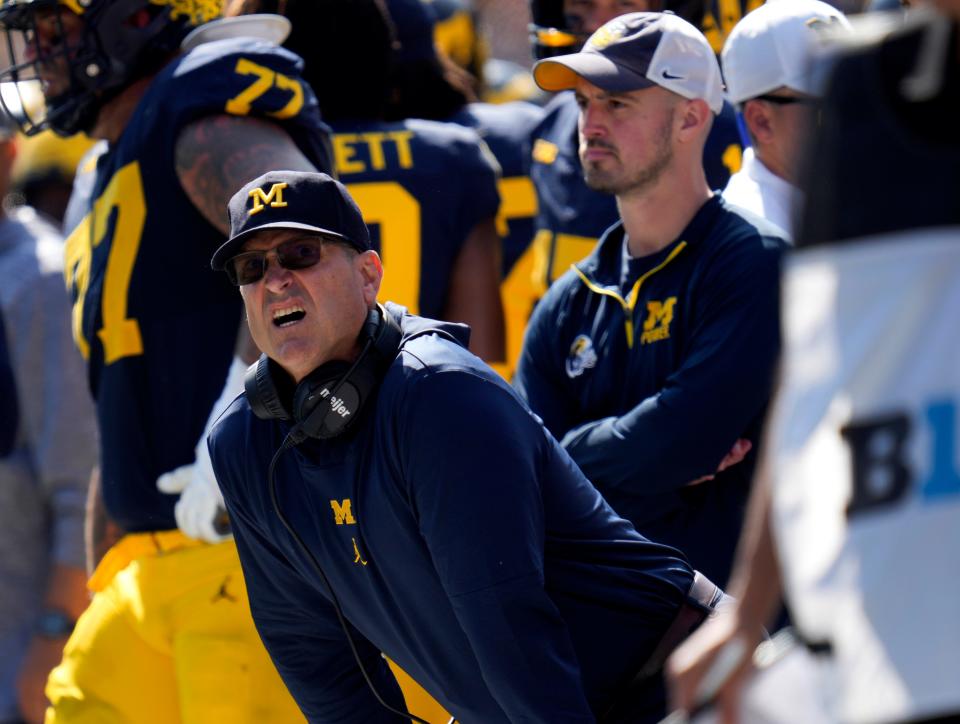A messy scandal, but it's clear: Michigan football must pay the price for rule-breaking
STATE COLLEGE, Pa. — Forget the timing, that the team was in the air when the decision came. Or that Michigan football has a game here tomorrow. That it somehow deserved to know its coach was suspended for three games before he got on a plane.
The program broke the rules. And hasn’t denied breaking them.
Besides, 13-page letters full of legalese aren’t written overnight; this isn’t a gangster movie and U-M doesn’t get steak and lobster delivered to its own luxury wing of the prison, complete with a razor blade to thinly shave the garlic.
Apparently, the school thinks it does, and argued in its request for an injunction that the Friday announcement — on a day in which federal courts are closed for Veterans' Day — was meant to “thwart the University from seeking immediate judicial relief.”
Michigan vs. Everybody, right?

FIRING BACK: Michigan files for temporary restraining order against Big Ten's suspension of Jim Harbaugh
Who knew that one of the most respected universities in the world was really a put-upon underdog? And needed to remind everybody of that fact by dressing some of its football players in t-shirts suggesting the same?
Yet there they were Friday afternoon, sporting sneering little “Michigan vs. Everybody” t-shirts as they walked toward the team plane that would fly them to State College. It’s not the players’ fault, of course, they’ve been conditioned to believe the Big Ten, the NCAA, the world is out to get them lately.
For once, the snappy moniker may be true. It is Michigan vs. Everybody, except that Michigan isn’t the innocent in this story. They earned the schadenfreude coming their way, fair and square.
And if the persecution complex helps them against Penn State? Well, good for them. None of this business has been fair to the student-athletes anyway.
Still, the lack of institutional awareness is rich. Or maybe it’s just a ruse.
Either way, the timing is the timing, stretched out by lawyers and quadruple checking. Just as the rules are the rules, no matter how silly or antiquated.
Again, Michigan's football program broke them. That's easy to lose sight of in this "what about" world, but sometimes breaking rules and facing consequences really are that simple.

And so, the Big Ten acted, suspending Jim Harbaugh for the last three games of the regular season. He’s still allowed to lead practice, film sessions, game plan, teach. He can spend all but four hours with his team every week the rest of the month
As punishments go, this is hardly the death penalty. It’s a fair and reasonable consequence for violating the spirit of competition, which is exactly what Michigan’s football program did. No amount of whataboutism undoes this.
Now, a federal judge may order an injunction stopping the Big Ten from suspending Harbaugh — U-M filed a motion asking as much — but that won’t change the facts:
Michigan football undercut the spirit of competition, and it doesn’t matter, at least relative to the conference’s ruling, if Connor Stalions acted alone or not. He was an employee acting on the program’s behalf. And his acts, as conference commissioner Tony Petitti noted in his letter to Warde Manuel, was “impermissible.”
An “organized, extensive, years-long in-person advance scouting scheme” whose goal was to “gain an unfair advantage by stealing the signs of teams that the University’s football team was due to play later in the season,” he wrote. “Such misconduct inherently compromises the integrity of competition … integrity of competition is the backbone of any sports conference or league … Athletes compete to win. Competition that is only about winning while disregarding the rules of fair play diminishes all of us, including our institutions. The integrity of the competition must be preeminent.”
What about reports suggesting three other teams shared U-M's signals with Wolverines opponents? The Big Ten said teams share intel all the time. Besides, as the conference noted in its letter to U-M, there weren’t facts to support that other programs violated bylaws that forbid advanced, in-person scouting.
A loophole?
Maybe. Heck, even probably, and the “spirit” of sharing intel probably wasn’t benign. But that’s a different conversation about other programs and the larger issue of whether rule changes are needed or not.

As the Big Ten wrote, the possibility that other schools in-person scouted doesn’t exonerate U-M. Nor should it.
Petitti argued U-M's football program violated section 10.01 of the conference agreement. It states, in part, that the Big Ten “expects all contests involving a member institution to be conducted without compromise to any fundamental element of sportsmanship. Such fundamental elements include integrity of the competition, civility toward all, and respect, particularly toward opponents and officials.”
What Stalions did — and, for the record, the conference said it had evidence Stalions did indeed scout in-person — obviously subverted this fundamental agreement, which means no further due process is needed to establish this.
To date, there is no evidence Harbaugh or any other member of this staff knew what Stalions had done. This explains why the penalty wasn’t harsher. If the NCAA’s investigation finds otherwise, then more punishment will come.
Considering the known facts, Petitti had no choice but to act. He, and the Big Ten, couldn’t let one of its members continue without some kind of reprimand, and whether he was pressured, coerced, shamed or cajoled into making the decision on the eve of the Wolverines’ biggest game thus far doesn’t matter at this point.
What matters is whether a judge agrees with him or not, and whether the program broke conference rules. The first question is still to be decided. The second question is not.
And even though no evidence links Harbaugh or his staff, Stalions was an employee when he carried out his scheme, and that makes Harbaugh responsible for his football-related actions.
You can quibble with the length and timing of the suspension and worry about the precedent Petitti is setting. Or you can acknowledge that the conference had enough evidence to penalize U-M, regardless of politics, and that the program is fortunate it wasn’t worse.
Contact Shawn Windsor: 313-222-6487 or swindsor@freepress.com. Follow him @shawnwindsor.
This article originally appeared on Detroit Free Press: Michigan hasn't denied sign-stealing, so shouldn't it be punished?

